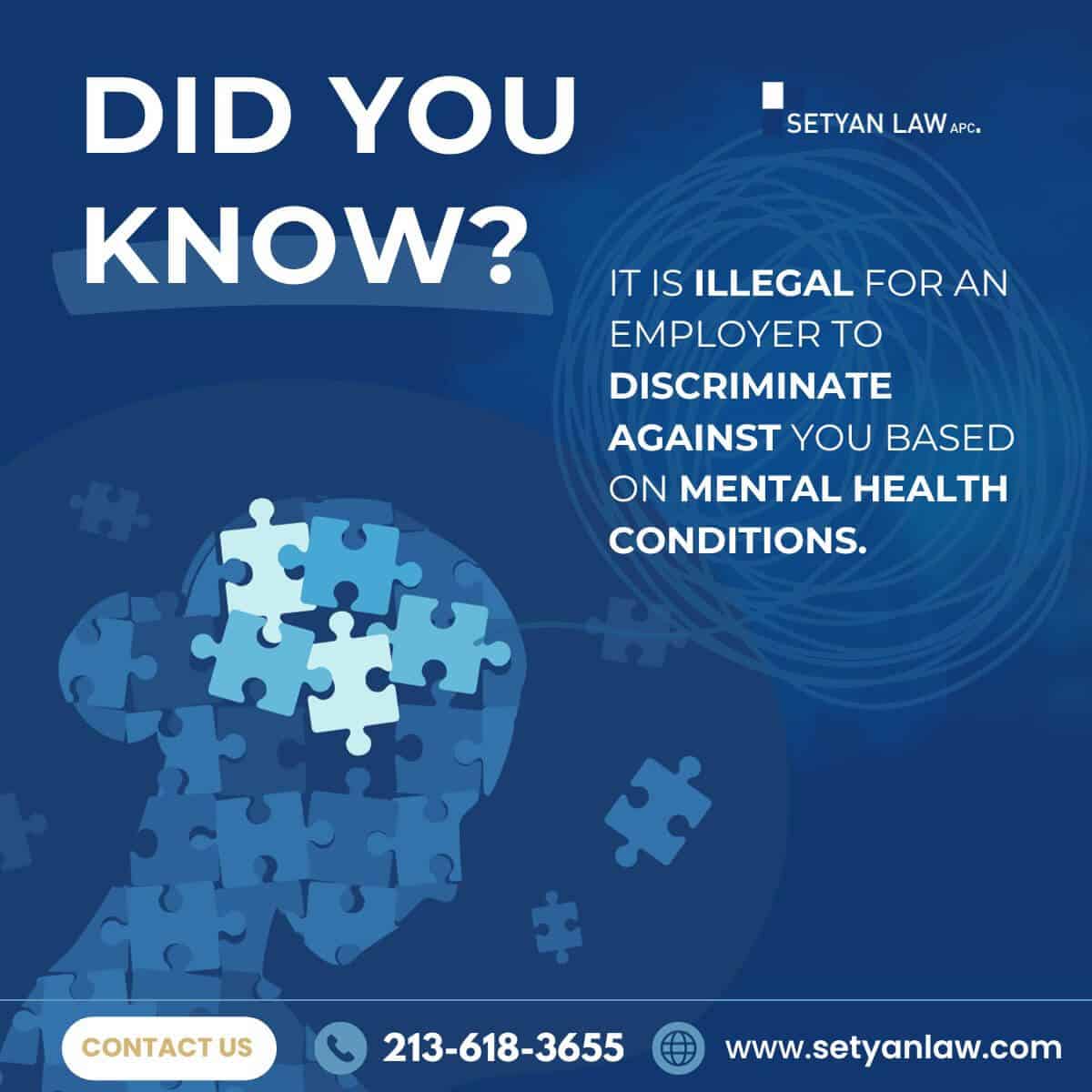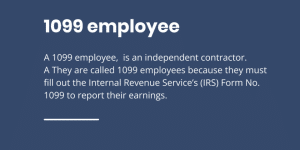Updated February 8, 2024
Your Legal Rights In The Workplace
In the modern workplace, individuals may face various challenges related to their mental health. Conditions like depression, anxiety, and post-traumatic stress disorder (PTSD) can significantly impact an employee’s well-being and ability to perform their job. However, it is crucial to remember that discrimination based on mental health conditions is illegal in California. As an employee, you have legal rights that protect you from unfair treatment.
This article aims to provide comprehensive information about your rights as a California employee regarding mental health conditions in the workplace. We will explore the legal protections in place, the process for requesting accommodations, and how to address discrimination and harassment. By understanding your rights, you can navigate the workplace with confidence and ensure that you are treated fairly.
Laws Protecting Employees with Mental Health Conditions
California has robust laws in place to protect employees with mental health conditions from discrimination. The Americans with Disabilities Act (ADA) is a federal law that prohibits discrimination against individuals with disabilities, including mental health conditions. The ADA applies to private employers with more than 15 employees and state and local government employers.
To qualify for protections under the ADA, you must demonstrate two key factors:
Presence of a Disability: You must have a mental health condition that substantially impairs one or more major life activities. This means that your condition interferes with daily or work activities such as concentrating, communicating, or regulating emotions.
Ability to Perform Essential Job Functions: You must be able to perform the essential functions of your job with or without reasonable accommodations. This means that you can complete the important tasks or core duties of your job.
In addition to the ADA, the Rehabilitation Act of 1973 protects federal government workers and employees at agencies that receive federal funding, including public schools and universities. Many states, including California, also have state-specific laws that further protect employees from discrimination in the workplace.
Requesting Reasonable Accommodations
If you have a mental health condition that requires accommodations in the workplace, it is essential to understand how to request them. The interactive process is a crucial step in determining whether a reasonable accommodation can be provided. Here’s what you need to know:
Initiating the Process: It is your responsibility to request an accommodation. Contact your employer’s Human Resources (HR) department to inquire about the process for requesting accommodations. Be prepared to explain the types of accommodations you need and how they will help you perform your job effectively.
Written Request: Put your accommodation request in writing to ensure clarity and documentation. Specify the specific accommodations you are seeking and how they will address the challenges posed by your mental health condition.
Consulting with a Healthcare Provider: In some cases, your employer may require documentation from a healthcare provider to verify your need for accommodations. This documentation should confirm that you have a mental health condition that necessitates accommodations without disclosing specific diagnostic information.
The Interactive Process: Once your employer is aware of your need for accommodations, they have a legal obligation to engage in the interactive process. This process involves a discussion between you and your employer to identify possible accommodations that will enable you to perform your job effectively. The employer should assess the effectiveness of each accommodation and document the process.
Reasonable Accommodations: An employer is required to provide reasonable accommodations that allow you to perform the essential job duties. These accommodations can vary depending on your specific needs and may include flexible work schedules, reduced distractions or noise, working from home, written directions, regular feedback, and more. Employers should evaluate each accommodation request on a case-by-case basis and assess whether it poses an undue burden on the business.
Your Rights: Protection Against Discrimination
Discrimination based on mental health conditions is illegal in the workplace, and employees have legal protections to ensure they are treated fairly. Understanding your rights is crucial to navigating the workplace and addressing any discriminatory practices. Here’s what you need to know:
Prohibited Actions: Employers are prohibited from discriminating against employees based on their mental health conditions. This includes actions such as firing, denying promotions, demoting, or subjecting employees to unfavorable work conditions due to their mental health.
Reasonable Accommodations: Employers must provide reasonable accommodations to employees with mental health conditions, as long as these accommodations do not pose an undue burden on the business. Employers cannot refuse to provide accommodations or retaliate against employees who request them.
Interactive Process: Employers must engage in the interactive process to determine suitable accommodations for employees with mental health conditions. This process involves open communication and collaboration between the employer and employee to find accommodations that meet the employee’s needs while allowing them to perform their job effectively.
Confidentiality: Employers are required to maintain confidentiality regarding an employee’s mental health condition. They should not disclose this information to other employees unless necessary for accommodation purposes or with the employee’s explicit consent.
Reporting Discrimination: If you believe you have experienced discrimination based on your mental health condition, you have the right to file a complaint. You can file a complaint with the Equal Employment Opportunity Commission (EEOC), the federal agency responsible for enforcing antidiscrimination laws. Additionally, some states have their own fair employment practice agencies where you can file a complaint.
Handling Harassment in the Workplace
Employees with mental health conditions may also face harassment based on their condition. Harassment can take various forms, including offensive comments, derogatory remarks, or creating a hostile work environment. It is essential to address and report harassment promptly. Here’s what you should do:
Know Your Rights: Familiarize yourself with your rights regarding harassment based on mental health conditions. The Americans with Disabilities Act (ADA) and state laws protect employees from harassment related to their mental health.
Documentation: Keep records of any incidents of harassment, including dates, times, locations, individuals involved, and details of what occurred. This documentation will be essential if you decide to file a complaint.
Report the Harassment: If you experience harassment, report it to your employer’s HR department or another designated authority within your organization. Follow the established reporting procedures and provide all relevant information.
Seek Legal Advice: If the harassment continues or if your employer fails to address the issue adequately, consult with an employment law attorney who specializes in workplace discrimination. They can provide guidance on your legal options and help protect your rights.
Dealing with Workplace Challenges
Employees with mental health conditions may face additional challenges in the workplace. It is important to understand how to navigate these challenges effectively while protecting your rights. Here are some strategies to consider:
Self-Care: Prioritize self-care to manage your mental health effectively. This may involve engaging in activities that promote well-being, seeking therapy or counseling, and practicing stress management techniques.
Open Communication: If you feel comfortable, consider discussing your mental health condition with a trusted supervisor or colleague. Open communication can help foster understanding and support, and may even lead to potential accommodations.
Know Your Resources: Familiarize yourself with the resources available to you, such as employee assistance programs (EAPs) or mental health support services offered by your employer. These resources can provide valuable support and guidance.
Educate Yourself: Stay informed about your rights as an employee with a mental health condition. Research employment laws, read company policies, and seek information from credible sources to ensure you are aware of your rights and protections.
Seek Support: Connect with support networks, such as mental health advocacy groups or employee resource groups, where you can find understanding and guidance from individuals who have experienced similar challenges.
Conclusion
As an employee in California, you have legal rights that protect you from discrimination based on mental health conditions in the workplace. Understanding these rights and the process for requesting accommodations is essential for navigating the workplace effectively. By advocating for yourself and seeking support when needed, you can ensure that your mental health is respected and that you are treated fairly in the workplace.
Remember, if you experience discrimination or harassment based on your mental health condition, there are legal avenues available to seek justice. Consult with an employment law attorney who specializes in workplace discrimination to discuss your options and protect your rights. Together, we can work towards creating inclusive and supportive work environments for all.
If you need employment litigation, please call Setyan Law at (213)-618-3655. Free consultation.






